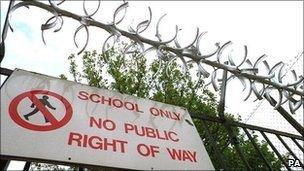Secondary school places in England to be announced
- Published

There are usually wide regional variations in how many families received their first preference
Hundreds of thousands of children in England are finding out whether they have a place at the secondary schools they want to go to.
Those waiting to hear about primary places will find out next month.
Last year, one in five children did not get their first choice of secondary school, rising to one in three in London.
Schools Minister Nick Gibb says there are still too many pupils trying to get into too few good schools.
He says changes being brought in by the government will create more good schools.
"Parents in the most deprived areas of the country are often left to choose between weak schools, and this is no choice at all," he said.
"Our school reforms will raise standards and create more good schools. We are turning around under performing schools that are failing their pupils."
Parents will be finding out by text, email or letter.
Full details about how many families got their first choice of school will not be published by the government until later this month.
New free schools
Some free schools which opened last September have seen a rush for places.
The West London Free School in Hammersmith says it had nearly 1,100 applications for 120 places. - about twice as many as last year.
The writer Toby Young, who set up the school with a group of parents, said: "We're delighted that the school's proved so popular with local parents.
"It's a huge vote of confidence in the school's outstanding teaching staff."
At Batley Grammar School in Kirklees, which returned to the state sector in September as a free school, there were 500 applications for 84 places.
A former private school, it is adding an extra class this September, with the support of the local authority, bringing the total pupils for Year 7 to 112. More than 20 pupils will move up from the junior school.
Head teacher Brigid Tullie said: "We are celebrating the school's 400th anniversary and the strength of the school has been in its ability to adapt over time. It's lovely that we are able to go back to providing education for more people in the community".
At Stour Valley Community School in Suffolk, which was set up after a campaign by parents, 86 offers of places have been made for the 108 available, although the school says more families are asking about places and it is confident it will be full in September.
At Sandbach School in South Cheshire, 183 pupils applied for the school as a first choice. There is space for 210 pupils in a year. It says it expects more students to come through for a September start and that like other schools in the area, it is feeling the impact of a population dip among the Year 7 age group.
The Maraharishi School in Lancashire, which is for four to 16-year-olds, only had space to take three more pupils in Year 7 and says there were 46 applications, although they do not know how many of those were first choice.
Emotional stress
Siobhan Freegard, co-founder of Netmums, said: "The scramble for primary school places is well documented, but in many ways the secondary school a child attends can actually have a bigger influence on their learning and success in life.
"The emotional stresses that both the parent and child go through together in assessing and selecting the right school for them only to be told 'No' cannot be underestimated. Often, however, there are appeals and waiting lists to go on so parents shouldn't despair."
Individual state schools or councils have their own criteria for deciding which students to admit if schools are over-subscribed.
They have to follow the government's Admissions Code, which says the highest priority must be given to children in care or those who have been in care, and sets out other rules for admissions.
In general, most schools allocate places on the basis of distance and whether a child has brothers or sisters there already, although faith schools can select on the basis of religion. Lotteries (random allocation) can also be used.
New Admissions Code
A new, slimmed-down version of the Admissions Code came in to force last month.
It includes changes which will allow schools to give preference to children of teachers at the same school.
And it also allows academies to prioritise children who are eligible for the Pupil Premium - extra money paid to schools for disadvantaged pupils.
In Northern Ireland, parents and children will find out about their school places in May.
In Scotland, school places are mainly determined by the catchment area in which a child lives, although parents can request a different school.
There is no set date when families hear about places.
In Wales, parents make their choice of school through their local authorities, which operate to various timetables.
Parents who fail to get their child in to the school of their choice can appeal against the decision.
- Published2 March 2012
- Published1 March 2011
- Published2 November 2011
- Published1 September 2011
- Published27 August 2010
- Published22 June 2011
- Published4 November 2011
- Published5 January 2012